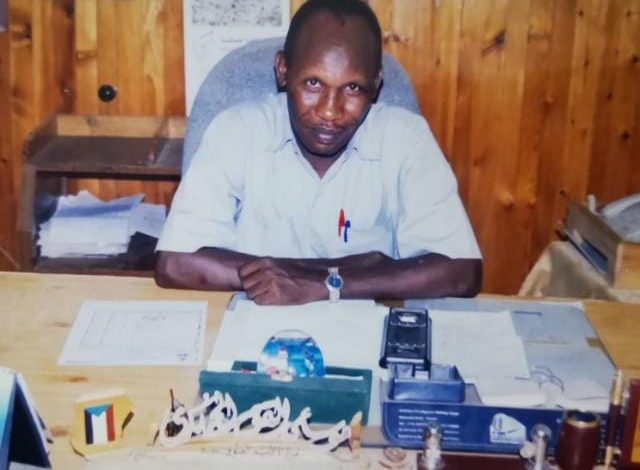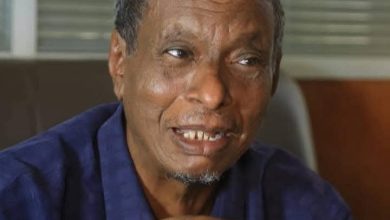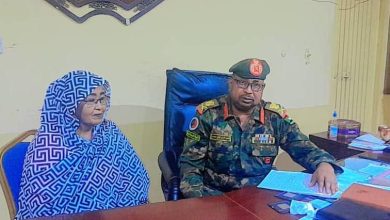Interviews
Director General of Sudan Railways Corporation in an Interview with (Al-Ahdath): “No one can sell the corporation’s lands, and Chinese and Russian companies have expressed interest in rehabilitating the railways.”

Interview – Rehab Abdullah
The Director General of Sudan Railways Corporation, Musa Al-Qawm Al-Juhadi, revealed that Chinese and Russian companies have expressed interest in rehabilitating the Sennar – Damazin railway. He confirmed their readiness to enter into partnerships to establish modern lines connecting neighboring countries (Egypt, Ethiopia, Chad, Central Africa, and South Sudan).
Al-Juhadi denied claims that brokers and traders sold railway lands in Khartoum and other states. He said, “No one can sell railway lands,” explaining that they are state property, and no one holds a certificate of ownership to sell them.
Al-Juhadi acknowledged the low salaries, wages, and pensions for railway workers, stating that the corporation follows the state’s unified salary structure, which is very weak. He noted that it is currently impossible to create a new salary structure due to the insufficient revenue that does not cover even the first payroll, especially after 80% of the network was paralyzed by the war and the remaining parts were damaged by floods.
How has the war affected the railway sector?
Yes, the war has significantly impacted the sector. Train services have stopped due to the country’s security conditions, including the suspension of the train line from Khartoum southward to Wad Madani in Al-Jazira State, Sennar, Kosti in the White Nile region, and Al-Obeid in North Kordofan – Al-Rahad – Nyala in South Darfur. The passenger train from Khartoum to Wad Madani has also stopped, along with the capital train heading to Atbara in northern Sudan, which was the most active before the war. Additionally, the eastern Sudan railway line connecting Haya, Kassala, Gedaref, and Sennar has ceased operations. Currently, only freight trains are operating between Port Sudan and Atbara. The war has also led to looting and theft of equipment and wooden sleepers near Sennar, along with damage and destruction to railway lines in some areas. We do not have an accurate assessment of the damage, especially in areas of armed conflict. The war has also contributed to reduced freight revenue and weakened overall earnings.
What are the obstacles to operating trains between Khartoum and Port Sudan?
The modern trains were initially planned to operate between Khartoum – Atbara and Khartoum – Madani. After the war, the movement was disrupted, and the plan to operate trains between Khartoum and Port Sudan was halted. The security committee in the Red Sea State requested that the train not be operated for security reasons, in addition to track cuts caused by floods. The Red Sea governor had approved running the train, but it hasn’t been possible yet.
What about operating the Atbara-Shendi line, as it’s considered a safe area?
The safe sections extend from Shendi to Port Sudan and from Atbara to Halfa. The Atbara-Halfa train had stopped for a long time due to track damage, but repairs are currently underway with newly received support. We aim to rebuild customer trust so they can resume their activities. As for the Port Sudan-Atbara line, it stopped due to security concerns raised by the Red Sea State. We assure that securing a train is much easier than securing buses, as we have facility protection, intelligence services, police, and security.
What is the higher management’s plan for rehabilitating railway lines and trains after the deterioration?
The higher management aims to maintain the rehabilitated line, which is the Port Sudan – Atbara – Khartoum – Wad Madani line, extending 961 km with welded rails and crushed stone, allowing a speed of up to 100 km/h for passenger trains and 70 km/h for freight trains. The plan also includes the gradual rehabilitation of the remaining lines (Madani/Al-Obeid, Ardeiba junction/Babanusa, completing the Abu Jabra/Nyala line, and then Abu Hamed/Halfa), with readiness to enter into partnerships for modern lines connecting neighboring countries (Egypt, Ethiopia, Chad, Central Africa, and South Sudan).
In terms of locomotives, we have 23 new diesel locomotives plus 7 maneuvering locomotives, adding to the existing fleet. These are sufficient for short- and medium-term operations but will require spare parts and regular maintenance, which can be managed with limited assistance from the Ministry of Finance to provide foreign currency.
Regarding the operational sector, can experts be leveraged to create partnerships with countries to develop the sector, like railway expert Engineer Qili Khalifa, who helped establish African railways?
Yes, we can definitely benefit from experts in creating partnerships, and figures like our senior brother Qili are invaluable. We plan to consult with them, God willing. Creating partnerships with other countries is essential, but it must be preceded by rehabilitating the lines in preparation for connecting with neighboring countries. As for advanced countries in railway systems, such as China, Egypt, India, and Malaysia, we can benefit from them in training and capacity building.
There have been agreements to restore production transport lines in the Damazin area and rehabilitate the Gezira project. Can you elaborate?
These are not agreements but rather feasibility studies for the Sennar-Damazin line. Some Chinese and Russian companies have expressed interest in rehabilitation, but no memorandums of understanding or agreements have been signed yet. Last week in Port Sudan, we discussed with the Russian delegation the funding and implementation of projects to rehabilitate unqualified railway lines and the connection projects with neighboring countries (Ethiopia and Egypt).
There are rumors that brokers and traders have sold railway lands in Khartoum and Sennar. What legal actions are being taken?
No one can sell railway lands simply because they are state property, and no one holds a certificate of ownership to sell them. The issue might be about subletting by the original lessee from the corporation, and in such cases, the lease contract is terminated, and legal action may be taken against the individual.
It is said that low salaries and pensions in the railway sector have driven many skilled employees to migrate. Is this true?
Yes, unfortunately, that is the reality. The corporation follows the state’s unified salary structure, which is very weak. It’s currently impossible to create a new salary structure due to insufficient revenue, which does not even cover the first payroll, especially after about 80% of the network has been disrupted by the war and the remaining parts have been submerged by floods.
Is there a plan to improve employee pensions?
Yes, the plan relies primarily on self-reliance, meaning increasing productivity and revenue to cover operational expenses. This will allow us to provide material support (healthcare, education, etc.) and offer consumer goods at discounted prices from surplus revenues.
Unfortunately, neither the Minister of Transport nor the Director of Railways participated in this summit. We await the feedback from the high committee to take the necessary actions.
Any positive news for railway workers?
We have encouraged employees to increase productivity to boost revenues, and we aim to capitalize on this momentum to reorganize internally and encourage supporters to assist us, building on our professional spirit and dedication. We also plan to make full use of the support provided in training and capacity building to localize the railway industry and management, catching up with countries that have advanced in this field.



